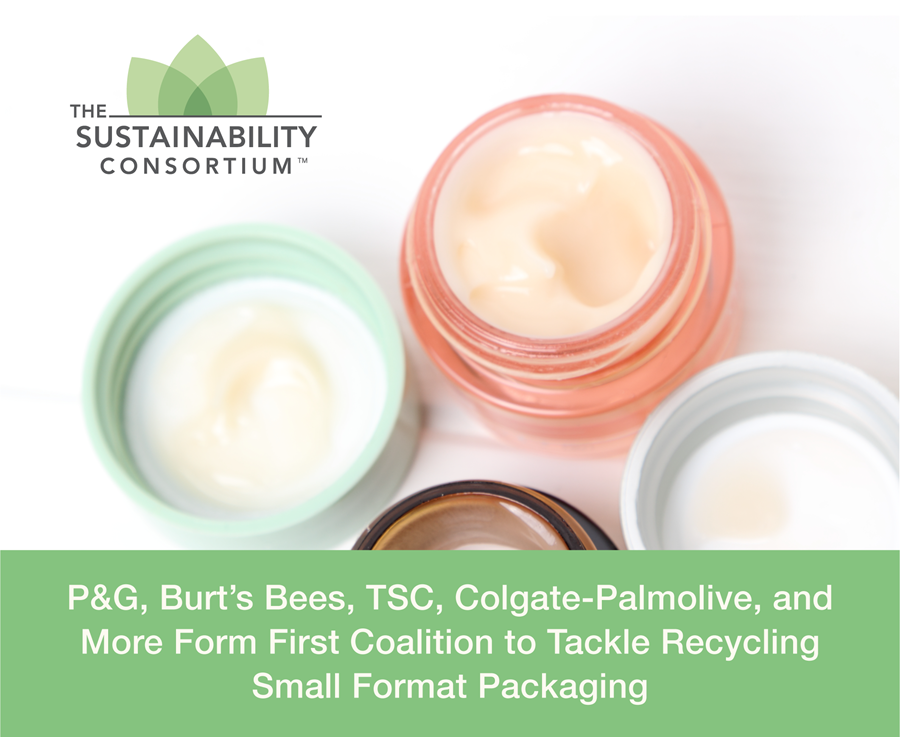TEMPE, Ariz., and FAYETTEVILLE, Ark. – The Sustainability Consortium announced Tuesday the formation of a new coalition of companies and organizations committed to creating resources to recycle small format packaging and other materials. This is the first coalition of its kind to include CPG companies, non-profits and universities. TSC, alongside P&G, Burt's Bees, Colgate-Palmolive, GSK, Sustainable Packaging Coalition, The Recycling Partnership, Balcones Resources, U of A and Arizona State University are collaborating to accelerate progress on building increased circularity of small format packaging of all material types through science-based, collective action projects.
The Association of Plastics Recyclers defines small format products and packaging as items smaller than 2 inches in two dimensions and has developed related sortability protocols for further testing. The Ellen MacArthur Foundation estimates that 10 percent of all packaging by weight is small format. Small format is commonly used in cosmetics and food service (e.g., lip balms, compacts, travel size shampoo, takeaway containers and disposable utensils) but includes items like beverage bottle caps, toys and other small packaging components that are currently unrecyclable in most curbside recycling programs due to the size of the screens used for sorting within material-recovery facilities. As a result of these challenges, the majority of small format is going to landfills or has the potential to become litter, rather than being captured as valuable material that can be used in other products and packaging through a more circular path.
Jennifer Park, TSC collective action manager, said, "This is an exciting collaboration of corporate, NGO, recycling and university thought leaders coming together to address a complex issue across the consumer goods industry and communities. The work is already providing important insights into how to improve the circularity of small format [packaging]."
"Burt's Bees has worked incredibly hard over the years to use less packaging, to be a leading brand in our use of recycled content and to design packaging that is recyclable. However, addressing the recycling of small format packaging, which represents a large proportion of our portfolio, requires a systemic approach. We're hopeful that this coalition will identify meaningful, scalable solutions," said Matt Kopac, associate director for sustainability, Burt's Bees.
Companies are increasingly setting goals to make 100 percent of their products and packaging recyclable, reusable or compostable by 2025 to align with such programs as the Ellen MacArthur Foundation New Plastics Economy, as well as to meet consumer demand.
"While many non-recyclable items can be made recyclable through better and more modern design, essential everyday items such as toothbrushes, trial sizes for a variety of products and small packaging for new concentrated product forms use minimal material. Rather than make them larger and use additional material, we are hopeful that a technological solution to effectively recycle these materials can be found through unprecedented collaboration," said Anne Bedarf, global packaging sustainability manager, Colgate-Palmolive.
TSC and Arizona State University's InnovationSpace partnered in 2020 to better understand the system in which small format packaging is managed. Students and faculty assessed how small format materials are captured, hauled and separated in material-recovery facilities to better understand the problem and identify roadblocks to more material being collected and recycled.
Moving forward, TSC and its partners will lead a coalition to 1) preform a waste characterization study of small format, including a projection of the volume and scale of collection to estimate economic value and 2) model and test MRF secondary sortation technologies and capabilities.
TSC translates the best sustainability science into business tools that are used all over the world to create more sustainable
consumer products.
Topics
Contacts
Carolyn Kaye Baltz, director, membership and development
Walton College of Business
479-575-5909,
